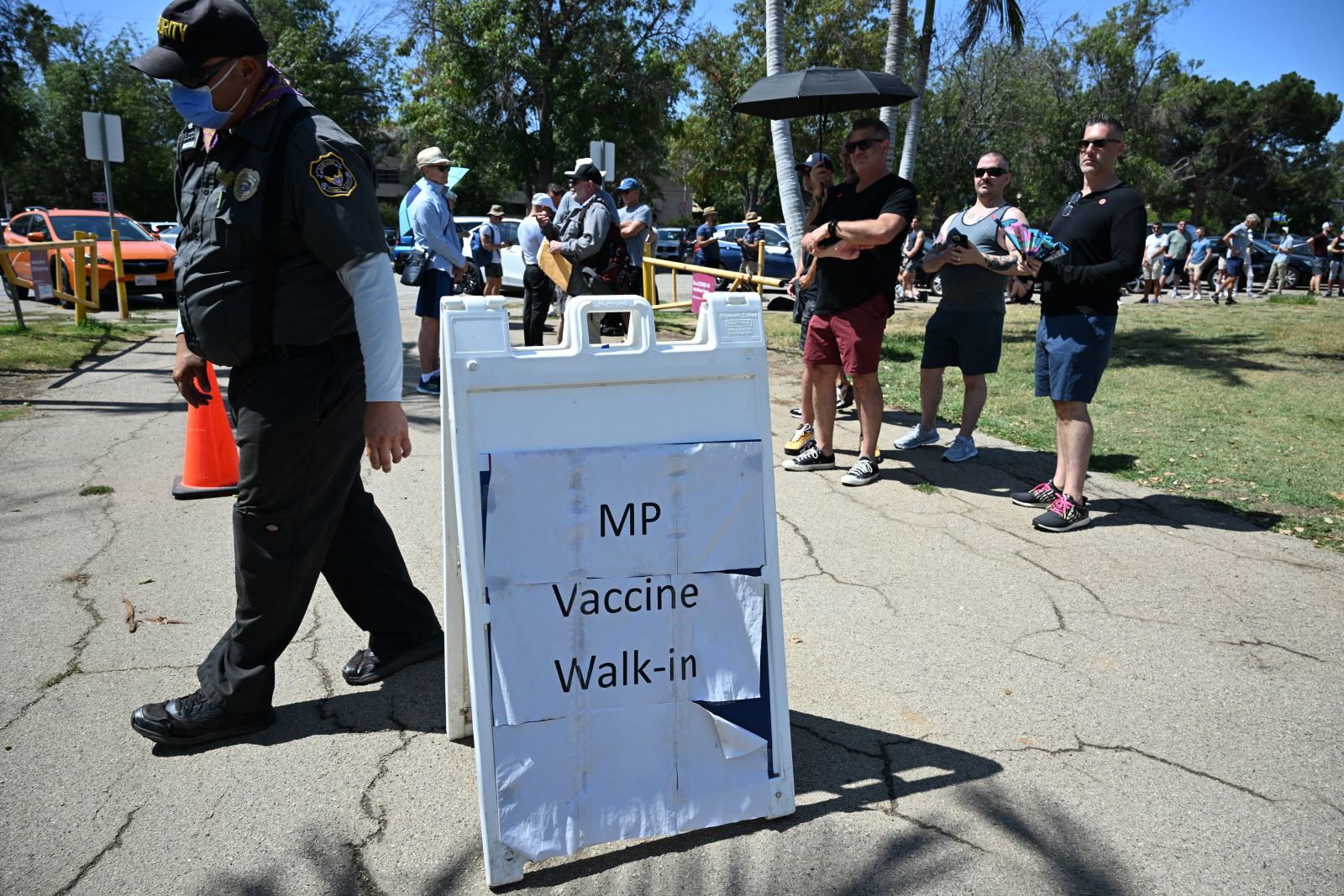CDC: People with STDs could be more affected by monkeypox 0:53
(CNN) --
Since the start of the monkeypox outbreak, scientists and activists have pushed for the name of the virus and the disease to be changed to something "non-discriminatory" and "non-stigmatizing."
Public health experts worry that stigma could keep people from getting tested and vaccinated.
A new name can help slow the spread of the disease, they say, but it has to be done quickly.
Nearly 60,000 cases have been identified worldwide, putting the name "monkeypox" on people's medical records.
The director-general of the World Health Organization promised in June that the name change would happen "as soon as possible", and the WHO said it was working with experts to rename the virus, its variants and the disease it causes.
But that was months ago.
What is a virus called?
Normally, the scientist who isolates a virus is the one who suggests the name.
Species naming is the responsibility of the WHO International Committee on Taxonomy of Viruses.
Scientists have been calling this virus "monkeypox" for 64 years.
advertising
Why listing monkeypox as a sexually transmitted disease goes beyond a simple label
In 1958, researcher Preben von Magnus and his team from Copenhagen, Denmark, discovered two outbreaks of a "smallpox-like disease" in a colony of crab-eating macaque monkeys that his laboratory used for vaccine production and research against polio.
The first human case of monkeypox was not documented until 1970. Scientists discovered a case in a 9-month-old boy in the Democratic Republic of the Congo.
The boy recovered from the monkeypox infection, but died six days later of measles.
After that, cases of the painful disease were documented in West and Central Africa.
Cases elsewhere were almost all linked to travel, according to the CDC.
But in 2018, the agency noted that over the previous decade, more human cases had been reported in countries that had not seen cases of the disease in several decades.
This surge, he said, was a "global health security concern."
The global push for the name change began this year, when an outbreak spiked in countries where monkeypox was not commonly found.
Case of monkeypox reported in a man whose 'main risk factor' was close non-sexual contact at a crowded outdoor event
New names for old viruses
The WHO said in an email to CNN that the process of reconsidering the names of all orthopoxvirus species, including cowpox, horsepox, camelpox, smallpox, had already begun. raccoon and skunk pox, as well as monkey pox.
According to WHO taxonomy committee member Colin McInnes, the panel is mandated to bring "the nomenclature of virus species in line with the way most other forms of life are named."
Traditionally, poxviruses were named after the animal in which the disease was first detected, but that created some inconsistencies, he said.
Monkeypox probably didn't start in monkeys.
Its origin remains unknown.
The virus can be found in other types of animals, such as Gambian giant rats, dormouse, and a couple of squirrel species.
McInnes, deputy director and chief scientist of the Moredun Group, which develops vaccines and tests for cattle and other animals, is studying squirrel pox, which could also be renamed.
He has been studying the feasibility of producing a vaccine against the virus, which can be deadly for red squirrels in the UK.
The current species known as "monkeypox virus" and the others would be renamed "'something' orthopoxviruses," he said in an email to CNN.
"It is the 'something' that is currently being debated," McInnes wrote.
McInnes said some scientists would prefer to keep the name monkeypox to preserve the link to 50 years of published research.
Others would want a totally different name.
The WHO committee has until June 2023 to suggest changes.
In August, the WHO announced that a group of experts had proposed new names for clades or variants of monkeypox.
Before more modern naming conventions, scientists named a variant by the region where it arose and circulated.
Now, to remove any stigma that comes with naming a disease after a region or country, the Congo Basin clade will be called clade I. The former West African clade is clade II.
A subvariant, clade IIb, is the one circulating mainly in the current outbreak.
dangerous stigma
Many scientists say that the WHO needs to work more urgently.
In July, after weeks had passed with no action taken, New York City's health commissioner sent a letter to the WHO, urging it to "act now before it's too late."
It cited "growing concern about the potentially devastating and stigmatizing effects that the message around the 'monkeypox' virus may have on these already vulnerable communities."
With the outbreak largely affecting gay and bisexual men and other men who have sex with men, stigma has been a constant concern for WHO Director-General Tedros Adhanom Ghebreyesus.
"Stigma and discrimination can be as dangerous as any virus," Tedros said when he declared monkeypox a global health emergency in July.
In the United States, the virus is disproportionately affecting black and Hispanic populations, according to the CDC.
Local public health data also shows that fewer members of either community are getting vaccinated against monkeypox.
CDC: Monkeypox has affected more men who have had sex with men, blacks and Hispanics
Experts are concerned that, in addition to barriers to accessing any kind of health care, some people are not getting vaccinated or tested because of the stigma attached to the disease.
dozens of suggestions
In the 2015 WHO naming conventions, the organization encouraged disease namers to avoid places, names, occupations, and animals due to stigmatization.
In August, the WHO encouraged people who wanted to propose new names for monkeypox to submit suggestions on its website.
Over 180 ideas have been suggested, some with a wide mix of creative explanations.
Some, like lopox, ovidpox, mixypox and roxypox, had no explanation.
A handful of them, like rodentpox, bonopox, and alaskapox, can be a joke.
Johanna Vogl, who introduced "greypox," wrote that the name "refers to a phenotypic mark of the disease, the greyish blisters, and is not associated with the color of human skin or with a place, group or animal."
Other suggestions are accompanied by stronger scientific explanations.
Dr. Jeremy Faust, an emergency medicine physician at Brigham and Women's Hospital in Boston and an instructor of emergency medicine at Harvard, suggested changing the name to opoxid-22.
"Although the monkeypox virus causing the current outbreak is not a new pathogen, I propose that, due to its designation as a Public Health Emergency of International Concern, its name change be warranted," Faust wrote in his proposal. .
He added that although this particular lineage of the virus appears to have originated before 2022, using this year can "limit the confusion."
Opoxid-22 reflects what is known about the virus, while dropping "monkey" from the name.
Faust said he was bothered by the inaccuracy of the monkeypox name and the stigma it conveyed.
But he said he submitted the name when he was waiting for another job to finish.
"Honestly, I was putting it off," Faust said.
He said that if the WHO chose his name, it could help more people seek treatment, testing and care.
"This is important," Faust said.
"The right name has to sound dry, technical, boring, so people aren't afraid to say they have that problem, right?"
Rossi Hassad, a research and statistics professor at Mercy College and a member of the American College of Epidemiology, introduced some names, including zpox-22, zopox-22, zovid-22, hpox22 and hpi-22.
Their proposal argues that, given the uncertainty about the origin of the virus, a more general name derived from a zoonosis, that is, a disease that can be transmitted from animals to humans, would drop the word "monkey" and be more inclusive.
Adding "22" would reflect the year scientists learned of this "outbreak with unusual and concerning human-to-human transmission," the proposal says.
Hassad said he was motivated to come up with names because the word "monkey" can have so many negative connotations.
"It has been used in racial and racist slurs against certain groups. I think it would be disingenuous not to acknowledge the damage that word has done," he said.
"It's also scientifically incorrect. It's a misnomer. If we want to be scientific, we have to be correct."
It's late and it falls short
Some US health departments are not waiting for the WHO, but the change is inconsistent.
The San Francisco Department of Health calls it MPX.
The one in Chicago calls it MPV.
Other cities hard hit by the outbreak, including Houston, New York and Philadelphia, have kept the traditional name, as has the CDC.
Daniel Driffin, an advocate for HIV patients and a consultant to NMAC, a national organization working for health equity and racial justice to end the HIV epidemic, said he hopes the name will change.
At the same time, he is disappointed that it was not until this outbreak, when people outside of Africa have been widely affected, that the push for change has begun.
"It's a name steeped in racism. It's late and it falls short. But I support the change and I think it will help," Driffin said.
"Think about the populations that will continue to be disproportionately impacted by this disease. It's been blacks and browns, so if we can remove oppressive racist tendencies from the nomenclature, I think we should."
monkey pox







